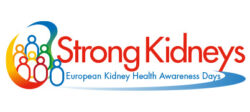Monoclonal gammopathy of unknown significance in kidney transplanted patients
All about kidneys
Here you will find information about kidney function, risk factors for kidney disease and how to reduce risk

Basic information for patients
One in ten Europeans suffers from reduced kidney function. However, many are unaware. Kidney disease is often silent at first and by the time symptoms develop, it may be at an advanced stage. As the kidneys cannot recover lost function, approaching the final stage little can be done other than to prepare for dialysis or transplantation.
To take the best care of your kidneys and keep them healthy, you need to understand them. Here you will find information about kidney function, risk factors for kidney disease and how to reduce risk. We also discuss symptoms, how to recognize them and how to treat the disease.
The kidney, called ren in Latin and nephros in Greek, is two bean-shaped organs located in the posterior abdominal cavity at the level of the lower ribs. The kidney of an adult is about the size of a fist, measuring about ten to twelve centimetres long and five to six centimetres wide. Each kidney weighs about 120 to 200 grams.
